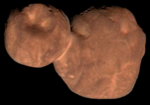| Event type | Gravitational wave |
|---|---|
| Date |
c. 2.4 billion years ago (detected 12 April 2019) |
| Instrument | LIGO and Virgo |
| Distance | c. 2.4 billion ly |
| Progenitor | 2 black holes |
GW 190412 was a gravitational wave (GW) signal observed by the LIGO and Virgo detectors on 12 April 2019. [1] [2] In April 2020, it was announced as the first time a collision of a pair of very differently sized black holes has been detected. [3] As a result of this asymmetry, the signal included two measurable harmonics with frequencies approximately a factor 1.5 (a perfect fifth) apart. [2] [4]
The collision took place 2.4 billion light-years away. [3] The heavier of the black holes had a mass of 29.7 solar masses, and the lighter one around 8.4 solar masses. [3] The difference in mass meant that the secondary harmonic in the signal was strong enough to be detected, allowing researchers to perform a test of general relativity and determine that the larger black hole was spinning. [3]
- ^ "Superevent info - S190412m". LIGO. Retrieved 12 April 2019.
- ^ a b The LIGO Scientific Collaboration; the Virgo Collaboration; Abbott, R.; Abbott, T. D.; Abraham, S.; Acernese, F.; Ackley, K.; Adams, C.; Adhikari, R. X.; Adya, V. B.; Affeldt, C.; Agathos, M.; Agatsuma, K.; Aggarwal, N.; Aguiar, O. D.; Aich, A.; Aiello, L.; Ain, A.; Ajith, P.; Akcay, S.; Allen, G.; Allocca, A.; Altin, P. A.; Amato, A.; Anand, S.; Ananyeva, A.; Anderson, S. B.; Anderson, W. G.; Angelova, S. V.; et al. (17 April 2020). "GW190412: Observation of a Binary-Black-Hole Coalescence with Asymmetric Masses". Physical Review D. 102 (4): 043015. arXiv: 2004.08342. Bibcode: 2020PhRvD.102d3015A. doi: 10.1103/PhysRevD.102.043015. S2CID 215814461.
- ^ a b c d Starr, Michelle. "Astronomers Find First-Ever Collision of Black Holes With a Strange Mass Discrepancy". ScienceAlert.
- ^ Berry, Christopher (18 April 2020). "GW190412—A new flavour of binary black hole". Christopher Berry.
| Event type | Gravitational wave |
|---|---|
| Date |
c. 2.4 billion years ago (detected 12 April 2019) |
| Instrument | LIGO and Virgo |
| Distance | c. 2.4 billion ly |
| Progenitor | 2 black holes |
GW 190412 was a gravitational wave (GW) signal observed by the LIGO and Virgo detectors on 12 April 2019. [1] [2] In April 2020, it was announced as the first time a collision of a pair of very differently sized black holes has been detected. [3] As a result of this asymmetry, the signal included two measurable harmonics with frequencies approximately a factor 1.5 (a perfect fifth) apart. [2] [4]
The collision took place 2.4 billion light-years away. [3] The heavier of the black holes had a mass of 29.7 solar masses, and the lighter one around 8.4 solar masses. [3] The difference in mass meant that the secondary harmonic in the signal was strong enough to be detected, allowing researchers to perform a test of general relativity and determine that the larger black hole was spinning. [3]
- ^ "Superevent info - S190412m". LIGO. Retrieved 12 April 2019.
- ^ a b The LIGO Scientific Collaboration; the Virgo Collaboration; Abbott, R.; Abbott, T. D.; Abraham, S.; Acernese, F.; Ackley, K.; Adams, C.; Adhikari, R. X.; Adya, V. B.; Affeldt, C.; Agathos, M.; Agatsuma, K.; Aggarwal, N.; Aguiar, O. D.; Aich, A.; Aiello, L.; Ain, A.; Ajith, P.; Akcay, S.; Allen, G.; Allocca, A.; Altin, P. A.; Amato, A.; Anand, S.; Ananyeva, A.; Anderson, S. B.; Anderson, W. G.; Angelova, S. V.; et al. (17 April 2020). "GW190412: Observation of a Binary-Black-Hole Coalescence with Asymmetric Masses". Physical Review D. 102 (4): 043015. arXiv: 2004.08342. Bibcode: 2020PhRvD.102d3015A. doi: 10.1103/PhysRevD.102.043015. S2CID 215814461.
- ^ a b c d Starr, Michelle. "Astronomers Find First-Ever Collision of Black Holes With a Strange Mass Discrepancy". ScienceAlert.
- ^ Berry, Christopher (18 April 2020). "GW190412—A new flavour of binary black hole". Christopher Berry.


